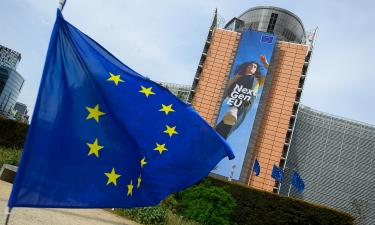US Conceit Put Off
 This time's mourning will be much more moderate. The United States is to mark the second anniversary of the appalling act of terror in a sort of undertone.
This time's mourning will be much more moderate. The United States is to mark the second anniversary of the appalling act of terror in a sort of undertone.
President Bush is not going to appear at the memorial service to be held at Ground Zero, the place where hell gaped two years ago. Instead he will go to church in the company of his wife, Laura, to stand in silence with his closest allies later in the day, on the lawn in front of the White House, in memory of the dreadful moment of September 11, 2001, when the American Airlines liner hit the north tower of the World Trade Center.
That day, at 8:46 a.m., marked the start of a new era in world history, which is dubbed 'A War Against International Terrorism.' The US administration does have good reason to spend the doleful day quietly, without excessive pathos: Something highly unpleasant has become obvious in the past few months. The war against the global evil is not coming out too successfully for the United States, if we put it mildly. Instead of the constant "shock and awe," it is turning into a sticky bog sucking in ever more resources, demanding new sacrifices and trials.
Washington's expectations have also smashed upon reality in another way. It has become clear that, no matter how fabulous the United states' military might and power, how much the prospect of a "new US age" might turn the heads of Washington neo-conservatives, and how much the ambition to act single-handed in any international situation might tickle their patriotic feelings, those ideas have failed the trial by the Iraqi war.
The White House is forced to publicly acknowledge its conceit defeated, and call to the international community - which only yesterday was deemed of secondary importance from the imperial point of view - with an earlier unthinkable proposal: Let us forget our former disagreements and share the responsibility for the consequences of what the US has done in Iraq.
All those confessions can be read between the lines of President Bush's latest State-of-the-Nation address he made as recently as last Sunday, four days before the anniversary of the tragic events.
Along with being addressed to foreign capitals, this speech - or rather the report on the work done to curb terrorism - is also addressed to the domestic audience.
The 'conveyer' losses of American soldiers in Iraq, along with the gloomy expectation of colossal expenditures for the restoration of what has been destroyed, have already brought Bush's rating down to its pre-war level. Only 47 percent approve of the president's actions today, while 54 are rather critical about them.
President Bush's address could hardly convert any of the skeptics. Despite the speech-writers' intention, the president's address acted as a flaws-revealing mirror which reflected too many details of the US administration's policy in combating international terrorism pursued in the past two years. That policy's advantages got easily obscured by its many drawbacks.
The White House must of course be credited for its resolution to eradicate terrorism throughout the world, tiring out its soldiers and exhausting the national coffers.
The President assured the country they would do all that is necessary and spend all it takes to achieve a decisive victory in the fight against terrorism. Specifically, that pledge is worth 87 billion dollars, or so says the estimate of expenditures in Iraq and partially, in Afghanistan, to be submitted to the Congress. Given the national budget deficit now reaching 500 billion, the law-makers are bound to be struck down by the request, the Republicans included.
This amount could even reflect Mr. Bush's bent toa sort of political masochism. The Republican political technologists have always been building on the assumption that a triumphant military leader's glamour will be the president's trump card in the 2004 election campaign and, consequently, will shield him from criticism of the sluggish economy and high unemployment rates. Today, however, the victory in Iraq is turning into yet another economic burden, even heavier than the economic decline.
This doesn't mean, however, that the president's efforts to fight terrorism are not at all recognized by the voters. Bush cited a whole scope of achievements in last Sunday's address, including the destruction of the Islamic fighters' bases in Afghanistan, the liquidation of "almost two-thirds" of the Al Qaeda leadership, and the creation of new security structures within the United States.
The headlong and virtually bloodless (in the beginning) overthrow of Saddam Hussein's regime was to crown the list with an exclamation mark. But in fact, it led to Iraq turning into "the central front" of the anti-terrorist war, in Bush's words, no one knowing for how long. Apparently, the 'gate' to Iraq, which swung open once touched, now refuses to let the 130,000 American soldiers out.
Critics wonder if this can't be explained by the US administration having no workable plan of post-war reconstruction of that country and of the US's divorce with the Iraq problem in general.
In his address, the president attempted to deflect those accusations by referring to rather vague goals of the US' Iraqi strategy, like "destroying terrorists," "ensuring other countries' support of a free Iraq" or "helping the Iraqis undertake full responsibility for their own future." This is not quite what the Democratic lawmakers wanted to hear, and even not what many of his own party members expected.
They didn't fail to notice, and neither, of course, did Bush's foreign audience, the remarkable 'figure of silence' which helped the president evade the number one topic: whether or not there had been any progress in finding mass destruction weapons in Iraq, or at least some indirect signs of forbidden armament programs. The inevitable conclusion is, no evidence whatsoever has been found. In other words, the key argument to justify the United States' invasion of a sovereign state in spite of the UN Security Council majority, turned out to be smoke without fire conjured by Washington and London fireworkers.
Today the US sees a way out in a sharp change of course - a partial renouncement of the proud but apparently defective attitude of a solitary fighter.
The former opponents of the invasion have been proposed a draft resolution to divide responsibilities in Iraq. The distribution seems quite familiar, with the US retaining the political and military leadership, while the rest, UN included, carrying on peacekeeping and financial aid. This balance is too selfish to satisfy France, Germany and Russia, which are now insisting on a truly central role of the UN and a detailed plan of handing the power over to the Iraqi people.
The tone of the passage in which Bush touched upon this important topic was curious enough. Not a single conciliatory note sounded there, let alone a confession: yes, you did warn us, and no, we didn't listen, sorry. It is the United Nations members' "responsibility," the US president said, to help Iraq, and that's that.
The US is still prone to going 'off key' - back to imperative - in its relations with the rest of the world, without realizing that it is its greatest weakness in its struggle against international terrorism.
Vladimir Simonov, RIAN
Subscribe to Pravda.Ru Telegram channel, Facebook, RSS!




